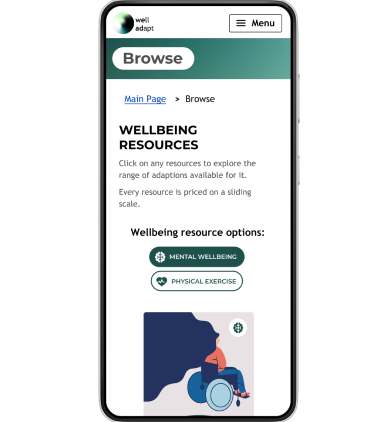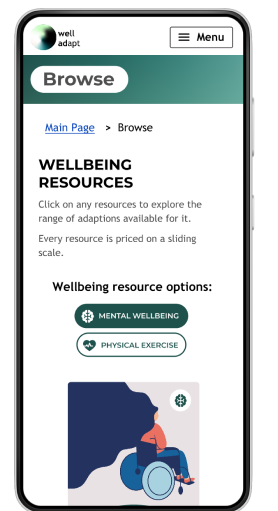This is description
Our Vision
Well Adapt aims to provide physical exercise and mental wellbeing resources to people with disabilities, chronic health conditions, learning and physical differences.
Disabled people account for 19% of the population however, most websites and apps for mental and physical health lack basic accessibility features such as closed captions, let alone content specific to issues of disability and health conditions.


Physical Exercise
We aim to produce physical exercise resources with a wide range of adaptions for different disabilities and physical differences. From exercising sitting down, to managing exercise with heat intolerance or hypermobile joints; overtime we hope to provide access to exercise to more and more people who are ignored in mainstream fitness content.
Mental Wellbeing
Our goal is to create a variety mental wellbeing resources tackling issues commonly faced by people with disabilities and chronic health coniditions. This includes articles and mindfulness techniques to help with issues such as chronic pain, getting a new diagnosis, managing fear in a progressive condition and more!
Over time, we hope to add further mental wellbeing techniques to our platform.
Accessible Content
We aim to produce content that is maximally accessible to the widest range of people we can. This means that we produce resources in a range of formats such as text, diagrams, audio, and video with BSL and closed captions. We are also committed to keeping our website up to date with the highest web accessibility standards; currently WCAG 2.1 AAA. Please see our accessibility page for more details.
Our Founding story
Our founder, Georgia Bondy, began Well Adapt after personally experiencing the lack of resources for physical exercise and mental wellbeing that worked for them as a disabled person.
‘For years before and after I was diagnosed with Multiple Sclerosis and Ehlers Danlos Syndrome, I had worsening physical and mental health that contributed to eachother in horrible cycles. I was offered NHS talking therapies but with poor mobility and crushing fatigue, I regularly failed to attend my appointments. Doctors told me that physical exercise would help but couldn’t tell me how to do it without causing debilitating flareups.
Eventually, I found mindfulness meditation that I could do at home whenever I was feeling up to it. The skills I learned were invaluble but nevertheless, it was imperfect. Mindfulness apps asked things of me that my body couldn’t do and it made me feel terribly alone. Exercise was also still out of reach; a single pilates class left me bed bound for a week.
A few year after that disastrous pilates class, I was creating my own mindfulness meditation practice and my improved mental health gave me the confidence to attend a pole class with an instructor that also had hypermobile joints. She taught me to exercise safely and I have rarely been more grateful to a human being. I have been pole dancing ever since!
These experiences made me realised that disabled people like myself have been problem solving their way to better physical and mental wellbeing as long as disability has existed. So much wellbeing knowledge exists in the disabled community and I want to share it with as many people as I can. That is what Well Adapt is all about.’
